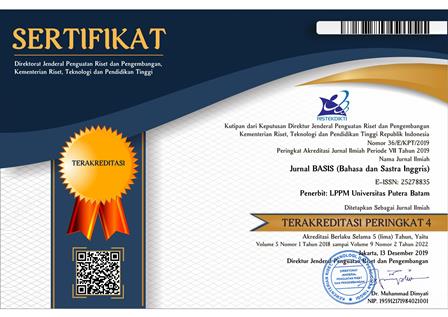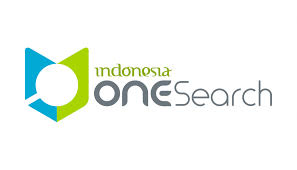ECOLINGUISTIC “WATER” IN TOBA BATAK LANGUAGE COMMUNITY
DOI:
https://doi.org/10.33884/basisupb.v6i2.1427Keywords:
Ecolinguistics, Water, Toba Batak Language SocietyAbstract
Ecolinguistics is an interdisciplinary study that looks at the link between ecology and linguistics. This study involves other studies, including sociology, anthropology, psychology, and political science. Socio-ecological aspects also greatly affect the maintenance, balance, and environmental inheritance of future generations. These local ecological wisdoms need to be included in a healthy and green environmental discourse (green speak). Knowledge about natural entities for millennial generation has begun to decrease due to the influence of digital technology which is very large. This can also lead to environmental damage and can also damage language by not understanding the cultural functions of the ecolexicon. The amount of Eco lexicon shifting ‘water’ causes millennial generation to no longer know the use of these words in Toba Batak culture. Changes in the lifestyle of the Toba Batak millennial generation have changed considerably and pay less attention to the natural cultural functions. The method used in this study is observation, interviews and qualitative descriptive. This study describes the fact that many natural ecolexics are not recognized anymore and even almost extinct in the Batak Toba community (rootlessness), some of which are mabakbak (flowing tears), bibis (flowing from a container fullness, lungkis (flowing smoothly) and then elaborated in the discussion.
References
___________. 2012. Linguistik Umum. Jakarta: Renika Cipta.
Denzin, Norman K dan Lincoln, Yvonna, Norman K. 2009. Handbook of Qualitative Research: Edisi Bahasa Indonesia. Yogyakarta: Pustaka Pelajar.
Fill, A. Dan P. Muhlhausler (ed,). 1995. The Ecolinguistics Reader: Language Ecology and Environment. London: Continuun.
Haugen, E. 1972. “The Ecology of Language”, in Dil, A. S. (ed.) The Ecology of Language: Essays by Einar Haugen, Stanford: Stanford University Press.
Kridalaksana, Harimurti. 1996. Pembentukan Kata dalam Bahasa Indonesia. (edisi kedua). Jakarta: PT Gramedia Pustaka Utama.
Mbete, A. M. dkk. 2009. Penyusunan Sosio ekologi Bahasa Melayu Langkat dan Bahasa Muna serta Upaya Pemberdayaannya. Laporan Penelitian. Denpasar: Universita Udayana.
Sapir, Edward. 1912. Language and Environtment, American Anthropologist. Volume 14, page 226-242. American Anthropological Association.
Sarmi, Ni Nyoman. 2015. Khazanah Leksikon Lingkungan Alam dalam Dinamika Guyub Tutur Bahasa Using: Kajian Ekolinguistik.” Denpasar: Doertasi Untuk Universitas Udayana.
Saussure, Ferdinand de. 1988. Pengantar Linguistik Umum. Terjemahan. Jogyakarta: Gajah Mada University Press, 1993, hlm. 2-3 dan 374-378.
Sudaryanto. 1988. Metode Linguistik Bagian Kedua: Metode dan Teknik. 1976. Pengumpulan Data. Yogyakarta: Gajah Mada University Press.
Sudaryanto. l993. Metode dan Aneka Teknik Analisis Bahasa Pengantar Penelitian Wahana Kebudayaan. Yogyakarta; Duta Wacana University Press.
Verhaar, J.W.M. 2012. Asas-asas Linguistik Umum. Yogyakarta: Gajah Mada University Press.
Downloads
Published
Issue
Section
License

















